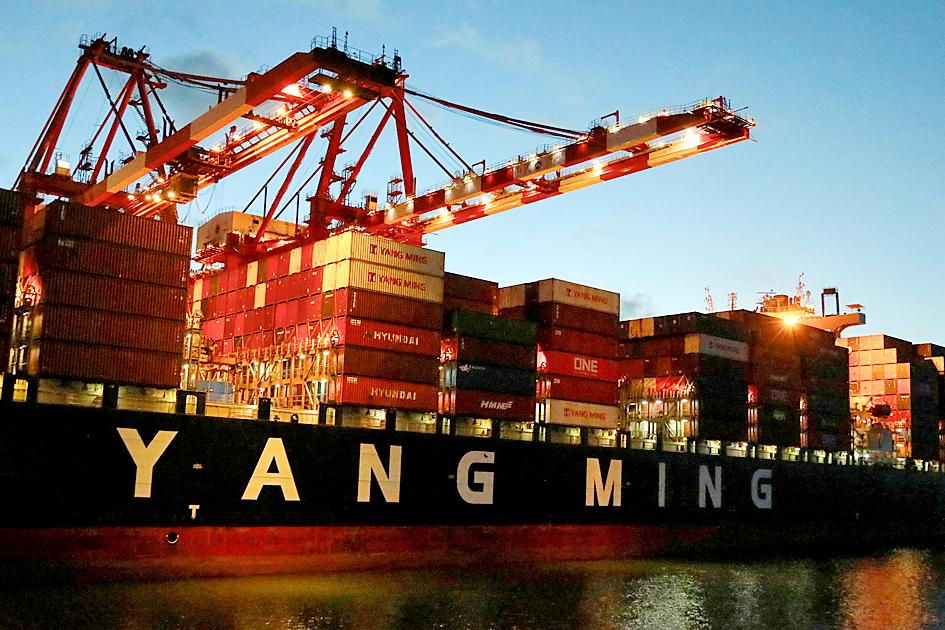The nation’s export orders last month grew 9.9 percent year-on-year to a record high US$50.03 billion, backed by rising demand for smartphones and 5G-related gadgets, as well as chips used in the devices, the Ministry of Economic Affairs (MOEA) said yesterday.
It was the seventh consecutive month of annual growth, and the ministry forecast that export orders would climb to between US$51.5 billion and US$53 billion this month, an increase of 8.9 percent to 12.1 percent year-on-year.
“Export orders were better than expected across all categories,” Department of Statistics Director Huang Yu-ling (黃于玲) said.

Photo: Ann Wang, Reuters
Growth in the electronic products sector was “especially notable,” Huang said, adding that the traditional sectors worst hit by the COVID-19 pandemic were “recovering.”
Orders for electronic products grew 29.7 percent year-on-year and 14.5 percent month-on-month to US$16.1 billion due to sustained strong demand for work-from-home equipment, 5G applications and high-performance computing equipment, she said.
However, Huawei Technologies Co (華為) stockpiling chips before US sanctions took effect on Sept. 15 was also a factor, she added.
Orders for optical equipment were up 19.6 percent year-on-year to US$2.4 billion on work-from-home, distance-learning and entertainment-at-home demand, she said.
Orders for the information and communications technology sector fell 9.6 percent year-on-year to US$13.9 billion due to the delayed launch of “a smartphone product by an international company,” Huang said.
Orders for base metal products arrested six straight months of year-on-year contraction, growing 14.8 percent year-on-year to US$2.2 billion.
Plastic product orders also returned to growth, increasing 13.9 percent year-on-year to US$2 billion, while those for chemical products fell 2.6 percent to US$1.4 billion, but the decline was mild compared with the double-digit percentage decreases in the previous six months.
Orders for mechanical products grew 23.7 percent year-on-year to US$1.9 billion, “as more countries allocate production back home,” the ministry said in a statement.
The percentage of products made in Taiwan last month increased to 46 percent from 42.7 percent in September last year, ministry data showed.
The increase reflects a trend to decentralize production, Huang said.
“China used to be the world’s factory, but we are seeing a trend to move production to other countries as a risk mitigation measure,” she said. “We expect to see this trend continue.”
Although export orders last month grew by 9.9 percent when calculated in US dollars, the growth was only 3.6 percent when calculated in New Taiwan dollars, due to the local currency’s appreciation.
Small and medium-sized enterprises would likely to be most hurt when the strength of the local currency begins to affect the competitiveness, Huang said.
“Large manufacturers are more likely to be price-setters in their industry and are insulated against fluctuating exchange rates through risk mitigation measures,” she said.
Overall, export orders in the third quarter grew 11.9 percent year-on-year to US$141.1 billion, while in the first three quarters of the year they rose 4.2 percent year-on-year to US$363.7 billion, ministry data showed.

INVESTIGATION: The case is the latest instance of a DPP figure being implicated in an espionage network accused of allegedly leaking information to Chinese intelligence Democratic Progressive Party (DPP) member Ho Jen-chieh (何仁傑) was detained and held incommunicado yesterday on suspicion of spying for China during his tenure as assistant to then-minister of foreign affairs Joseph Wu (吳釗燮). The Taipei District Prosecutors’ Office said Ho was implicated during its investigation into alleged spying activities by former Presidential Office consultant Wu Shang-yu (吳尚雨). Prosecutors said there is reason to believe Ho breached the National Security Act (國家安全法) by leaking classified Ministry of Foreign Affairs information to Chinese intelligence. Following interrogation, prosecutors petitioned the Taipei District Court to detain Ho, citing concerns over potential collusion or tampering of evidence. The

TRADE: The premier pledged safeguards on ‘Made in Taiwan’ labeling, anti-dumping measures and stricter export controls to strengthen its position in trade talks Products labeled “made in Taiwan” must be genuinely made in Taiwan, Premier Cho Jung-tai (卓榮泰) said yesterday, vowing to enforce strict safeguards against “origin laundering” and initiate anti-dumping investigations to prevent China dumping its products in Taiwan. Cho made the remarks in a discussion session with representatives from industries in Kaohsiung. In response to the US government’s recent announcement of “reciprocal” tariffs on its trading partners, President William Lai (賴清德) and Cho last week began a series of consultations with industry leaders nationwide to gather feedback and address concerns. Taiwanese and US officials held a videoconference on Friday evening to discuss the

NEGOTIATIONS: The US response to the countermeasures and plans Taiwan presented has been positive, including boosting procurement and investment, the president said Taiwan is included in the first group for trade negotiations with the US, President William Lai (賴清德) said yesterday, as he seeks to shield Taiwanese exporters from a 32 percent tariff. In Washington, US Trade Representative Jamieson Greer said in an interview on Fox News on Thursday that he would speak to his Taiwanese and Israeli counterparts yesterday about tariffs after holding a long discussion with the Vietnamese earlier. US President Donald Trump on Wednesday postponed punishing levies on multiple trade partners, including Taiwan, for three months after trillions of US dollars were wiped off global markets. He has maintained a 10 percent

PERSONAL DATA: The implicated KMT members allegedly compiled their petitions by copying names from party lists without the consent of the people concerned Judicial authorities searched six locations yesterday and questioned six people, including one elderly Chinese Nationalist Party (KMT) member and five KMT Youth League associates, about alleged signature forgery and fraud relating to their recall efforts against two Democratic Progressive Party (DPP) legislators. After launching a probe into alleged signature forgery and related fraud in the KMT’s recall effort, prosecutors received a number of complaints, including about one petition that had 1,748 signatures of voters whose family members said they had already passed away, and also voters who said they did not approve the use of their name, Taipei Deputy Chief Prosecutor